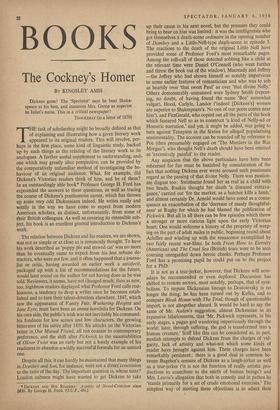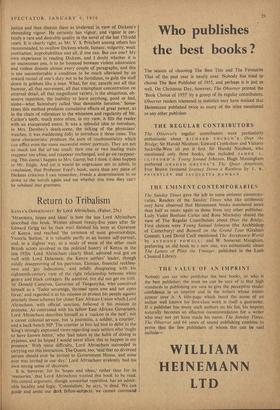BOOKS
The Cockney's Homer
BY KINGSLEY AMIS Dickens gone! The 'Spectator' says he beat Shake- speare at his best, and instances Mrs. Gamp as superior to Juliet's nurse. This in a critical newspaper !
THACKERAY (in a letter of 1870) THE task of scholarship might be broadly defined as that of explaining and illustrating how a given literary work . appeared to its original readers. This will involve, per- haps in the first place, some kind of linguistic study, backed up by such things as the relating of the literary work to its analogues. A further useful supplement to understanding, and. one which may greatly alter perspective, can be provided by the comparatively unfamiliar method of investigating the be- haviour of an original audience. What, for example, did Dickens's Victorian readers think of him, and he of them? In an outstandingly able book* Professor George H. Ford has expounded the answers to these questions, as well as tracing the course of Dickens's posthumous career, which has thrown up some very odd Dickensians indeed. He writes easily and wittily in the way we have come to expect from modern American scholars, as distinct, unfortunately, from some of their British colleagues. As well as covering its ostensible sub- ject, his book is an excellent general introduction to Dickens's work.
The relation between Dickens and his readers, we are shown, was novas simple or as close as is commonly thought. To have his work described as 'puppy pie and stewed cat' was no more than he eventually came to expect from his less urbane de- tractors, who were not few, and it often happened that a journa- Iist or critic, having awarded an earlier work a satisfecit, packaged up with a list of recommendations for the future, would later round on the author for not having done as he was told. Reviewers, it seems, have not changed much; then as now, too, highbrow readers displayed what Professor Ford calls rest- lessness, a tendency to drop a writer once he becomes estab- lished and to turn their talent-detectors elsewhere. 1847, which saw the appearance of Vanity Fair, Wuthering Heights and Jane Eyre, must have been an annus horribilis for Dickens. On his own side, the public's wish was not inevitably his command: his fondness for low scenes and low characters, the growing bitterness of his satire after 1850, his attacks on the Victorian home in,Our Mutual Friend, all ran counter to contemporary preference, and the shift after Pickwick to the unamiabilities of Oliver Twist was an early but not a lonely example of his readiness to abandon a wildly successful formula for an untried one.
Despite all this, it can hardly be maintained that many things in Dombey and Son, for instance, were not a direct concession to the taste of the day. The important question is, whose taste? London cabmen might have wanted to get Dickens to take * DICKENS AND His READERS: Aspects of Novel-Criticism since 1836. By George H. Ford. (0.U.P., 48s.) up their cause in his next novel, but the pressure they could bring to bear on him was limited : it was the intelligentsia who got themselves a death-scene ordinaire in the opening number of Dombey and a Little-Nell-type death-scene in episode 5. The reactions to the death of the original Little Nell have provided some of Professor Ford's most remarkable pages.
Among the roll-call of those detected sobbing like a child at the relevant time were Daniel O'Connell (who went further and threw the book out of the window), Macready and Jeffrey —the Jeffrey who had shown himself so notably impervious to some earlier features of romanticism and who was to sob as heartily over 'that sweet Paul' as over 'that divine Nelly.' Others demonstrably unmanned were Sydney Smith (repent- ing, no doubt, of having found the name `Boz' somewhat vulgar), Hood, Carlyle, Landor (`indeed [Dickens's] women are superior to Shakespeare's. No one of our poets comes near him'), and FitzGerald, who copied out all the parts of the book which featured Nell so as to construct 'a kind of Nelly-ad or Homeric narration,' and yet, it might be added, was going to turn against Tennyson in the Sixties for alleged popularising sentimentality. The account can be rounded off by reference to Poe (then presumably engaged on 'The Murders in the Rue Morgue'), who thought Nell's death should have been omitted as 'excessively painful' to the reader.
Any suspicion that the above particulars have here been rehearsed for fun must be banished by consideration of the fact that nothing Dickens ever wrote aroused' such passionate regard as the passing of that divine Nelly. There was passion- ate disgust too : Swinburne found her as real as a child with two heads, Ruskin thought her death 'a diseased extrava- gance,' carried out 'for the market, as a butcher kills a lamb,' and almost certainly Dr. Arnold would have noted as a conse- quence an exacerbation of the 'decrease of manly thoughtful- ness' at Rugby for which he had blamed the publication of Pickwick. But all in all there can be few episodes which throw a stronger or more curious light upon the early Victorian heart. One would welcome a history of the propriety of weep- ing on the part of adult males in public, beginning round about Achilles and winding up with the renascence exemplified by two fairly recent war-films. In both From Here to Eternity (American) and The Cruel Sea (British) tears were to be seen coursing unregarded down heroic cheeks. Perhaps Professor Ford has a promising pupil he could put on to the project for a PhD.
It is not as a tear-jerker, however, that Dickens will now- adays be recommended or even deplored. Discussion has shifted to remote sectors, most notably, perhaps, that of sym- bolism. To impute Dickensian lineage to Dostoievsky is no longer the thing; he has been turned out by Kafka, and to compare Bleak House with The Trial, though of questionable import, is not altogether absurd. It would be hard to say the same of Mr. Auden's suggestion, almost Dickensian in its expansive hilariousness, that 'Mr. Pickwick represents, in his early stages, a pagan god wandering imperviously through the world; later, through suffering, the god is transformed into a human creature.' Stuff like this can be considered as, in part, modish attempts to defend Dickens from the charges of vul- garity, lack of artistry and what-not which some kinds of reader have brought against him. TheSe charges have been remarkably persistent : there is a good deal in common be- tween Bagehot's censure of Dickens as a laugh-jerker as well as a tear-jerker (`it is not the function of really artistic pro- ductions to contribute to the mirth of human beings') and Mrs. Leavis's allegation that both in comedy and in pathos he `stands primarily for a set of crude emotional exercises.' The simplest way of meeting these objections is to admit their
justice and then dismiss them as irrelevant in view of Dickens's abounding vigour. He certainly has vigour, and vigour is cer- tainly a rare and desirable quality in the novel of the last 150-odd years. It is clearly right, as Mr. V. S. Pritchett among others has recommended, to swallow Dickens whole, fantasy, vulgarity, weak motivation, improbabilities and all, if one can. But can one? My own experience in reading Dickens, and I doubt whether it is an uncommon one, is to be bounced between violent admiration and violent distaste almost every' couple of paragraphs, and this is too uncomfortable a condition to be much alleviated by an inward recital of one's duty not to be fastidious, to gulp the stuff down in gobbets like a man. What, for me, cancels out all that humour, all that movement, all that triumphant concentration on external detail, all that magnificent variety, is the ubiquitous, ob- sessive repetition, the inability to leave anything, good or bad, alone—what Saintsbury called 'that damnable iteration.' Some- times this method produces cumulative effects of great power, as in the chain of references to the whiteness and regularity of Mr. Carker's teeth; much more often, in my view, it fills the reader with an exasperated ennui. It was a splendid idea to introduce, in Mrs. Dombey's death-scene, the ticking of the physicians' watches; it was maddening folly to introduce it three times. The same characteristic produces the aura of insubstantiality which can afflict even the more successful minor portraits. They are not so much too flat as' too small; their one or two leading traits reappear too often, and reappear unchanged, and go on reappear- ing. This doesn't happen to Mrs. Clamp, but I think it does happen to Mr. Jingle. And yet it would be ungracious not to admit, in conclusion, that Professor Ford's book, more than any piece of Dickens criticism I can remember, breeds a determination to sit down to the novels again and see whether this time they can't be subdued into greatness.



































 Previous page
Previous page